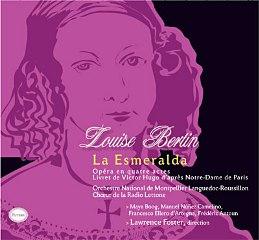Louise Bertin - La Esmeralda (2008)
Louise Bertin - La Esmeralda (2008)

1. Act I 2. Act II 3. Act III 4. Act IV Maya Boog - La Esmeralda Manuel Nunez Camelino – Phoebus Francesco Ellero d’Artegna – Frollo Frédéric Antoun – Quasimodo Yves Saelens – Clopin Eugénie Danglade - Fleur de Lys Eric Huchet - Vicomte de Gif Marie-France Gascard - Madame Aloďse de Gondelaurier Evgueniy Alexeiev - Monsieur de Morlaix Marc Mazuir - Monsieur de Chevreuse Sherri Sassoon-Deshler – Diane Alexandra Dauphin-Heiser – Bérangere Gundars Dzilums - Pierrat Torterue Choeur de la Radio Lettone Orchestre National de Montpellier Languedoc-Rousillon Lawrence Foster Montpellier, Opera Berlioz - Le Corum, 23 July 2008.
Here's a novelty indeed. Louise Bertin was a composer of opera in France during the 1820s and 1830s and a friend of Berlioz, who expressed admiration for her music and, indeed, conducted the opera recorded here. Despite her musical gifts and the extra kudos of having the libretto (based on `Notre Dame de Paris') written by Victor Hugo himself, Bertin's work seems to have fallen foul of political partisanship in the French capital and press intriguing against the prominent Bertin family. Sadly, the composer withdrew from composition following the events surrounding the premiere of `La Esmeralda' and composed no further operas even though she lived another 41 years.
The musical style will seem familiar to anyone who enjoys the music of composers such as Auber or Hérold, who were also writing at that time. It is perhaps not as polished or as catchy melodically as the operas of her more famous colleagues, though there is a very attractive duet for Esmeralda and Phoebus in Act One and a very fine "Bell" aria for Quasimodo later in the opera - there even sprang up a rumour that Berlioz had written this as an interpolation of his own, an allegation which he denied, stressing that he had merely advised Bertin how she might improve the closing bars and make them more effective. Bertin displays a skilled hand with the orchestra and her scoring is colourful; contemporary critics complained that her instrumentation was too brass-heavy and noisy, but that's certainly not the effect that comes across in this set.
`La Esmeralda' followed upon an operatic setting of the `Faust' story and both those operas, according to the liner notes, represent a `coming of age' in her music, as opposed to her first two lighter and comic works. Berlioz complained about some of her word-setting and it has to be admitted that occasionally the vocal lines do sound a little awkward in the way they match music and text. Nonetheless, this is a very attractive work and it is tempting to wonder what Bertin might have achieved had Parisian politics not led her to abandon hope of achieving success as a composer. Certainly, with further experience of writing for the theatre, I think she could have honed her craft and produced some great music.
The recording is a live one, from a production at the Festival de Radio France et Montpellier Languedoc-Roussillon. Unless you absolutely demand a studio recording at all costs, don't let that put you off - there is very little extraneous noise and the soundscape is natural and faithful. The performance is equally fine and the principals sing well - the only singer who, to my ears, fell below the generally high standards was Francesco Ellero d'Artegna as Frollo, whose voice seemed too lightweight to convince in the role and occasionally sounded strained. All in all this is a fascinating and rewarding issue - very much recommended. --- J. A. Peacock, amazon.com
The story dates back to January 6, 1482 in Paris, France, the day of the ‘Festival of Fools’ in Paris. Quasimodo, the deformed bell-ringer of Notre Dame, is introduced by his crowning as Pope of Fools.
Esmeralda, a beautiful Gypsy with a kind and generous heart, captures the hearts of many men, including that of a Captain Phoebus, but especially those of Quasimodo and his adopted father, Claude Frollo, the Archdeacon of Notre Dame. Frollo is torn between his lust and the rules of the church. He orders Quasimodo to kidnap her, but the hunchback is suddenly captured by Phoebus and his guards who save Esmeralda. Quasimodo is sentenced to be whipped and ordered to be tied down by the heat. Esmeralda, seeing his thirst, offers him water. It saves her, for she captures his heart.
Esmeralda is later charged with the attempted murder of Phoebus, whom Frollo attempted to kill in jealousy, and is sentenced to death by hanging. As she is being led to the gallows, Quasimodo swings down by the bell rope of Notre Dame and carries her off to the cathedral under the law of sanctuary. Clopin rallies the Truands (criminals of Paris) to charge the cathedral and rescue Esmeralda. The King, seeing the chaos, vetoes the law of sanctuary and commands his troops to take Esmeralda out and kill her. When Quasimodo sees the Truands, he assumes they are there to hurt Esmeralda, so he drives them off. Frollo betrays Esmeralda by handing her to the troops and watches while she is hanged. Quasimodo pushes him from the heights of Notre Dame to his death. Quasimodo then goes to a mass grave, lies next to her corpse, crawls off to Esmeralda’s tomb with his arms around her body and eventually dies of starvation. Two years later, excavationists find the skeletons of Esmeralda with a broken neck and Quasimodo locked in an embrace. --- operatoday.com
download (mp3 @320 kbs):
uploaded yandex 4shared mega mediafire zalivalka cloudmailru oboom uplea
Zmieniony (Piątek, 16 Październik 2015 11:23)








